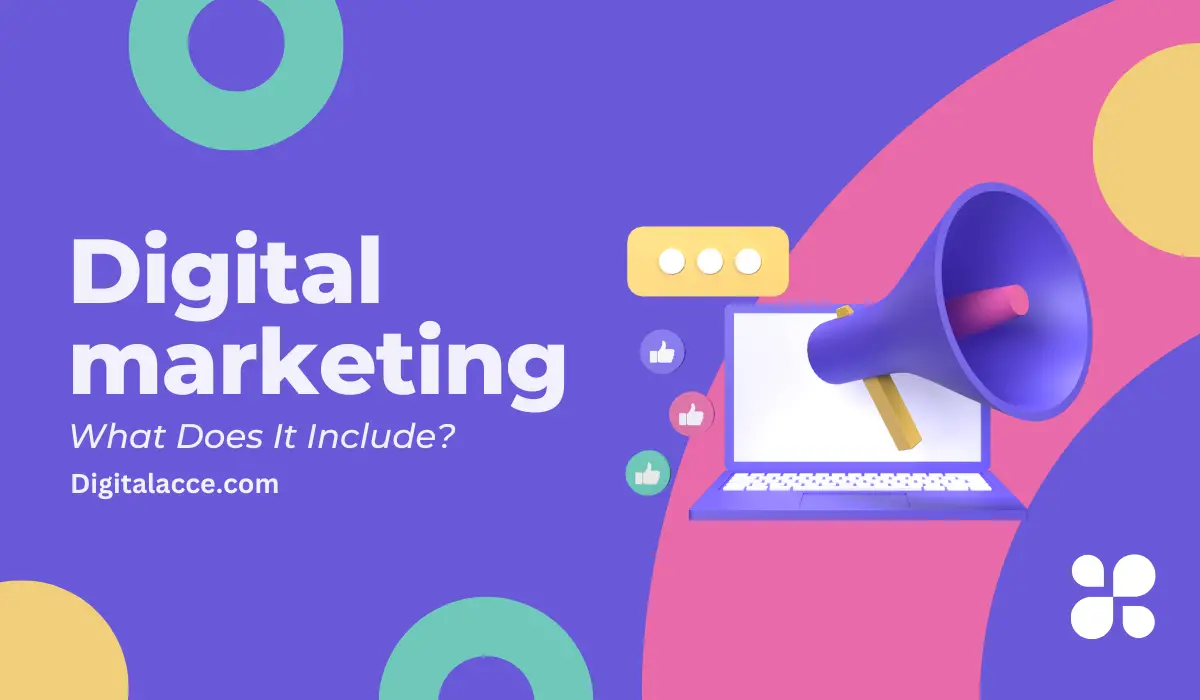In today’s digital age, businesses are increasingly turning to online platforms to reach their target audience. Digital marketing has become an essential part of any modern marketing strategy. But what does digital marketing include?
In this article, we will define digital marketing and explore its ever-changing nature. We will examine the various components and strategies used in digital marketing, as well as the emerging technologies and trends that are shaping the industry.
We will also look at the challenges facing digital marketers and the future of digital marketing in a post-pandemic world. Join us as we dive into the world of digital marketing and discover how it can help businesses succeed in today’s fast-paced and ever-changing marketplace.
Contents
- Definition of digital marketing
- Significance of digital marketing in the modern world
- The ever-changing nature of the digital marketing industry
- What Does Digital Marketing Include? 6 Major Components of Digital Marketing
- Trends and Emerging Technologies in Digital Marketing
- Challenges and Future of Digital Marketing
- The role of Digital Marketing in a post-pandemic world
- Conclusion
Definition of digital marketing
Digital marketing refers to the use of digital channels and technologies to promote products, services, or brands.
It encompasses a broad range of tactics and techniques that leverage digital platforms such as search engines, social media, email, mobile apps, and websites to engage with consumers and attract new customers.
Digital marketing allows businesses to reach their target audience more effectively and efficiently than traditional marketing methods, and it provides a wealth of data and insights that can be used to optimize marketing campaigns and drive business growth.
Significance of digital marketing in the modern world
Digital marketing has become increasingly significant in the modern world, due to several factors:
- Reach: It allows businesses to reach a wider audience than ever before, thanks to the ubiquity of digital devices and internet connectivity.
- Cost-Effective: Compared to traditional marketing methods, it is often more affordable, enabling businesses of all sizes to compete on a level playing field.
- Targeting: Highly targeted campaigns can reach specific audiences with tailored messaging and content, increasing the chances of conversion.
- Data: It provides a wealth of analytics and data, allowing businesses to track and measure the effectiveness of their campaigns and make data-driven decisions.
- Engagement: It enables businesses to engage with their customers in real-time, fostering better relationships and increasing customer loyalty.
Overall, digital marketing has become a crucial tool for businesses looking to stay competitive in the modern world, and its significance is only expected to grow in the coming years.
The ever-changing nature of the digital marketing industry
The digital marketing industry is constantly evolving, as new technologies, platforms, and consumer behaviors emerge. It is highly competitive, with businesses vying for attention in an ever-expanding array of channels and platforms.
The rise of social media, mobile devices, and other emerging technologies has transformed the way businesses engage with their customers, presenting new opportunities and challenges for marketers. For example, the growth of mobile has led to an increased focus on mobile optimization and mobile-specific marketing strategies.
Similarly, the emergence of artificial intelligence and machine learning has opened up new avenues for personalization and targeting, while also raising ethical questions about data privacy and security.
The digital marketing industry is also highly responsive to consumer trends and behaviors, with marketers constantly adapting their strategies to stay relevant and engaging. The shift towards more immersive and interactive content, such as video and virtual reality, is just one example of how the industry is evolving to meet changing consumer demands.
In order to succeed in the digital marketing industry, businesses must be adaptable, flexible, and always willing to learn and experiment. As new technologies and platforms emerge, marketers must be willing to pivot and adapt their strategies in order to stay ahead of the curve.
What Does Digital Marketing Include? 6 Major Components of Digital Marketing
Digital marketing is a broad field that includes many different components and techniques. Here are some of the key components of digital marketing:
- Search Engine Optimization (SEO)
- Pay-Per-Click (PPC) Advertising
- Social Media Marketing
- Email Marketing
- Mobile Marketing
- Digital PR
Each of these components of Digital Marketing would be highlighted briefly.
Search Engine Optimization (SEO)
Search Engine Optimization (SEO) is the process of optimizing website content and structure to improve its visibility and ranking on search engine results pages. The goal of SEO is to increase organic traffic to a website through better visibility and ranking on search engines like Google.
SEO involves many different techniques, including keyword research, on-page optimization, link building, and content creation.
By optimizing a website for search engines, businesses can increase their visibility to potential customers and drive more traffic to their site. SEO is an ongoing process that requires continuous monitoring and adjustment to stay effective.
Pay-Per-Click (PPC) Advertising
Pay-per-Click (PPC) advertising is a form of digital advertising in which businesses pay for each click on their ads. PPC ads are typically displayed on search engine results pages (such as Google Ads) or social media platforms (such as Facebook Ads), and businesses can target specific keywords, demographics, and behaviors to ensure their ads are seen by their desired audience.
For example, a business selling fitness equipment might create a PPC ad that appears at the top of Google search results when someone types in “buy fitness equipment.” The ad will only incur a cost if someone clicks on it, at which point they will be taken to the business’s website.
PPC campaigns can be highly effective, as they allow businesses to target customers who are actively searching for products or services they offer. They also provide valuable data and analytics, which businesses can use to measure the success of their campaigns and make data-driven decisions.
PPC advertising requires careful monitoring and management to ensure the best return on investment (ROI), as businesses must balance the cost of each click with the potential benefits of increased traffic and conversions.
Social Media Marketing
Social Media Marketing is the use of social media platforms to promote products and services, engage with customers, and build brand awareness. Businesses can create content, such as posts, images, and videos, that are designed to reach and engage with their target audience on social media.
For example, a clothing brand might create an Instagram post showcasing its new summer collection. The post may include high-quality images, a brief description, and relevant hashtags to increase visibility. By using social media to showcase its products and interact with its followers, the brand can increase its visibility, build brand loyalty, and potentially drive sales.
Social Media Marketing can also include paid advertising on social media platforms, which allows businesses to target specific demographics and interests with their ads. With the right strategy, Social Media Marketing can be a powerful tool for businesses to connect with their audience and achieve their marketing goals.
Email Marketing
Email Marketing is a digital marketing strategy that involves sending targeted promotional messages and newsletters to a subscriber list. Businesses can use email marketing to keep customers informed about new products and services, promotions, and industry news.
For example, a retail store might send an email to its subscribers about an upcoming sale. The email might include a special offer or coupon code to incentivize subscribers to visit the store or make a purchase online.
According to a study by Campaign Monitor, email marketing has a median ROI of 122%, which is four times higher than other digital marketing channels such as social media and paid search. This makes email marketing a highly effective way for businesses to connect with their audience and drive conversions.
Overall, Email Marketing is an important component of digital marketing, as it allows businesses to stay in touch with customers and promote their products or services directly to their target audience.
Influencer Marketing
Influencer Marketing is a type of digital marketing that involves collaborating with individuals who have a large following on social media to promote products and services. Influencers can range from celebrities to niche experts and can have millions of followers on platforms like Instagram, TikTok, and YouTube.
Here are a few statistics that highlight the impact of Influencer Marketing:
- According to a study by Influencer Marketing Hub, businesses can earn an average of $5.78 in earned media value for every $1 spent on influencer marketing.
- In a survey by Mediakix, 80% of marketers found Influencer Marketing to be effective, with 89% of those using it stating that it provides a higher ROI than other marketing channels.
- Another study by Linqia found that 39% of marketers plan to increase their Influencer Marketing budgets in 2021.
Influencer Marketing can be a powerful tool for businesses to connect with their target audience and drive sales. By leveraging the trust and influence that influencers have with their followers, businesses can reach a large audience with a message that resonates with them.
Mobile Marketing
Mobile Marketing is a type of digital marketing that involves reaching and engaging with audiences on mobile devices such as smartphones and tablets. It can can take many forms, including mobile-optimized websites, mobile apps, SMS and MMS messaging, and mobile advertising.
Despite the growing importance of mobile devices in people’s daily lives, Mobile Marketing is not as common as other types of digital marketing such as SEO, PPC, and Social Media Marketing.
This is in part because Mobile Marketing requires specialized knowledge and skills, and many businesses have yet to fully embrace it as part of their overall marketing strategy.
However, with the rise of mobile usage and the increasing prevalence of mobile-based purchases, Mobile Marketing is becoming increasingly important.
As more and more consumers turn to their mobile devices to make purchases and access information, businesses that fail to include Mobile Marketing in their digital marketing strategy risk falling behind their competitors.
In order to stay competitive in today’s digital landscape, it is important for businesses to understand and leverage all aspects of digital marketing, including Mobile Marketing, as part of a comprehensive and effective marketing strategy.
Digital PR
Digital PR is an important aspect of digital marketing that focuses on building a positive online presence for businesses through media coverage, influencer outreach, and other public relations tactics. It involves using digital channels to reach out to journalists, bloggers, and social media influencers in order to secure coverage for a brand, product, or service.
One of the key benefits of digital PR is that it can help businesses to build strong relationships with influential voices in their industry, which can in turn help to boost their visibility, credibility, and reputation.
By leveraging these relationships and securing coverage on authoritative websites and social media platforms, businesses can build their brand, generate buzz, and drive traffic to their website.
Another benefit of digital PR is that it can help to enhance SEO by generating high-quality backlinks from authoritative sources. These backlinks can help to boost a website’s search engine rankings, making it more visible and accessible to potential customers.
Overall, digital PR is an important aspect of digital marketing that businesses can use to build their brand, generate buzz, and drive traffic to their website.
Trends and Emerging Technologies in Digital Marketing
Digital Marketing is an ever-evolving field, and staying up to date with the latest trends and emerging technologies is essential for businesses looking to remain competitive in the digital space. Here are a few trends and emerging technologies in digital marketing:
- Artificial Intelligence (AI) – AI is being used in digital marketing to automate routine tasks, analyze data, and personalize content and messaging to individual users.
- Voice Search – With the rise of voice assistants like Alexa and Google Home, optimizing content for voice search is becoming increasingly important.
- Video Marketing – Video content is becoming a major driver of engagement on social media and other digital channels, and businesses are increasingly incorporating video into their marketing strategies.
- Chatbots – Chatbots are being used to provide 24/7 customer service, answer questions, and provide product recommendations.
- Augmented Reality (AR) – AR is being used in marketing to provide immersive experiences for customers, allowing them to see how products would look in their environment.
Keeping up with these trends and emerging technologies can be a challenge, but businesses that are able to stay ahead of the curve will be better positioned to reach and engage with their target audience. By understanding what digital marketing includes and how it is evolving, businesses can create effective digital marketing strategies that drive growth and success.
Challenges and Future of Digital Marketing
Digital Marketing is a rapidly evolving field, and with that comes a number of challenges and opportunities for the future. Here are a few key challenges and future trends to keep in mind:
- Increasing competition – As more businesses move their marketing efforts online, competition for audience attention and engagement is becoming increasingly fierce.
- Privacy and Data Protection – With new data privacy regulations such as GDPR and CCPA, businesses need to ensure they are collecting and processing customer data in a compliant and ethical manner.
- Ad Fraud and Brand Safety – With the rise of ad fraud and brand safety concerns, businesses need to be vigilant in monitoring their ad placements and ensuring they are not inadvertently supporting harmful content.
- Personalization – With the rise of AI and machine learning, consumers are increasingly expecting personalized experiences, putting pressure on businesses to deliver highly targeted content and messaging.
- Ad-blockers and Ad-fatigue – both ad-blockers and ad-fatigue present significant challenges for digital marketers. By creating targeted, relevant, and engaging content, businesses can overcome these challenges and build strong relationships with their customers.
In the future, we can expect to see continued advancements in AI, voice and visual search, and the use of augmented and virtual reality in marketing. Additionally, with the rise of smart devices and the Internet of Things, there will be more opportunities for businesses to connect with customers in new and innovative ways.
Overall, while there are certainly challenges to navigate, the future of digital marketing is bright. By staying up to date with the latest trends and technologies, and by prioritizing customer privacy and personalization, businesses can create effective digital marketing strategies that drive growth and success.
The role of Digital Marketing in a post-pandemic world
The COVID-19 pandemic has transformed many aspects of our lives, including the way businesses operate and interact with their customers. The digital world has become an essential part of how we connect and communicate, and as a result, digital marketing has taken on an even more significant role in a post-pandemic world.
Here are a few key ways in which digital marketing can play a vital role in a post-pandemic world:
- Building an online presence – With many consumers shifting their purchasing habits online, businesses need to have a strong online presence to remain competitive. Digital marketing plays a crucial role in building brand awareness and driving traffic to online stores.
- Creating engaging content – With many people spending more time online, businesses need to create engaging and informative content to keep their audience engaged and interested.
- Providing personalized experiences – With the rise of AI and machine learning, businesses can use data to provide highly personalized experiences that meet the unique needs and preferences of individual customers.
- Adapting to changing consumer behaviors – With the pandemic changing consumer behaviors and preferences, businesses need to be flexible and adaptable in their digital marketing strategies to keep up with these changes.
Overall, the pandemic has accelerated the shift towards digital marketing, and businesses that are able to embrace this trend and create effective digital marketing strategies will be better positioned for success in a post-pandemic world.
By leveraging the latest trends and technologies, businesses can connect with their customers in new and innovative ways, building strong relationships and driving growth and success.
Conclusion
In conclusion, digital marketing is a rapidly evolving industry that encompasses a wide range of components, including search engine optimization, pay-per-click advertising, social media marketing, email marketing, influencer marketing, and mobile marketing.
With the rise of new technologies and the increasing importance of online presence, businesses need to stay up to date with the latest trends and best practices in order to succeed in the digital world.
Despite the challenges presented by ad-blockers and ad fatigue, businesses that develop effective digital marketing strategies can build strong relationships with their customers, and drive growth and success in the long term.
In this post-pandemic world, digital marketing will become even more crucial, playing a vital role in connecting businesses with their customers and driving growth and success in a constantly evolving landscape.
In short, what does Digital Marketing include? It includes a vast array of strategies and technologies that businesses can leverage to connect with their customers in new and innovative ways.
By staying up to date with the latest trends and best practices, businesses can build strong relationships with their customers and drive success in an increasingly digital world.


